News from the Institute
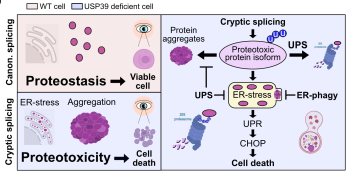
In a study published in today’s issue of Science, a team around IBC2 Director Ivan Đikić reveals how cells deploy ubiquitination and selective autophagy to combat the harmful effects of cryptic splicing, protecting against accumulation of misfolded proteins and preserving cellular health.
... (read more)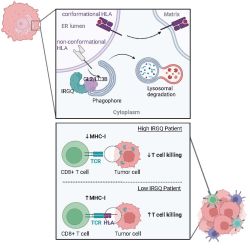
Together with a multidisciplinary, international team, former IBC2 Team Leader Lina Herhaus (now at Helmholtz HZI) and IBC2 Director Ivan Đikić found a new role for the so-far uncharacterized GTPase family Q protein (IRGQ).
... (read more)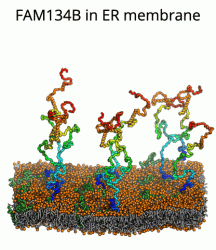
Until now, the involvement of intrinsic disorder in membrane shaping processes has not been fully understood. A multidisciplinary group around IBC2 Team Leader Ram Bhaskara now reports in PNAS detailed insights into how intrinsically disordered regions (IDRs) in proteins help remodel cellular structures, particularly within the membrane proteins of the endoplasmic reticulum (ER).
... (read more)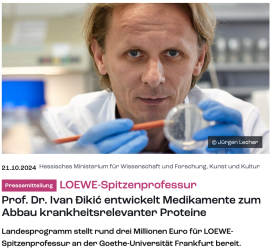
IBC2 Director Ivan Đikić has been awarded a prestigious LOEWE-Spitzenprofessur at Goethe University Frankfurt. The Hessian LOEWE research program provides around € 3 M over five years and will support Ivan’s drug development projects, focusing on proximity induction as innovative mode-of-action. Throughout his career, Ivan dedicated his work to uncovering mechanisms that regulate cellular quality control. Early on, he pioneered the concept of ubiquitin as a versatile cellular signal. More recently, he focussed on reprogramming the body’s natural degradation pathways — such as the ubiquitin and autophagy systems — to target harmful proteins or organelles. This opens up new therapeutic options for a variety of diseases like cancer, neurodegenerative disorders and infections, including those that were previously considered untreatable.
... (read more)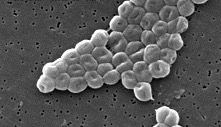
Acinetobacter baumannii is a bacterium resistant to antibiotics and known for causing severe infections, particularly in hospitals. In this study, we compared proteins in healthy human cells and cells infected by A. baumannii to understand how the bacteria cause disease. Our findings reveal that the transcriptional factor FOS becomes much more abundant in human cells during infection. Interestingly, when we used drugs to block FOS, the cytotoxic effects of the bacteria were significantly reduced.
... (read more)